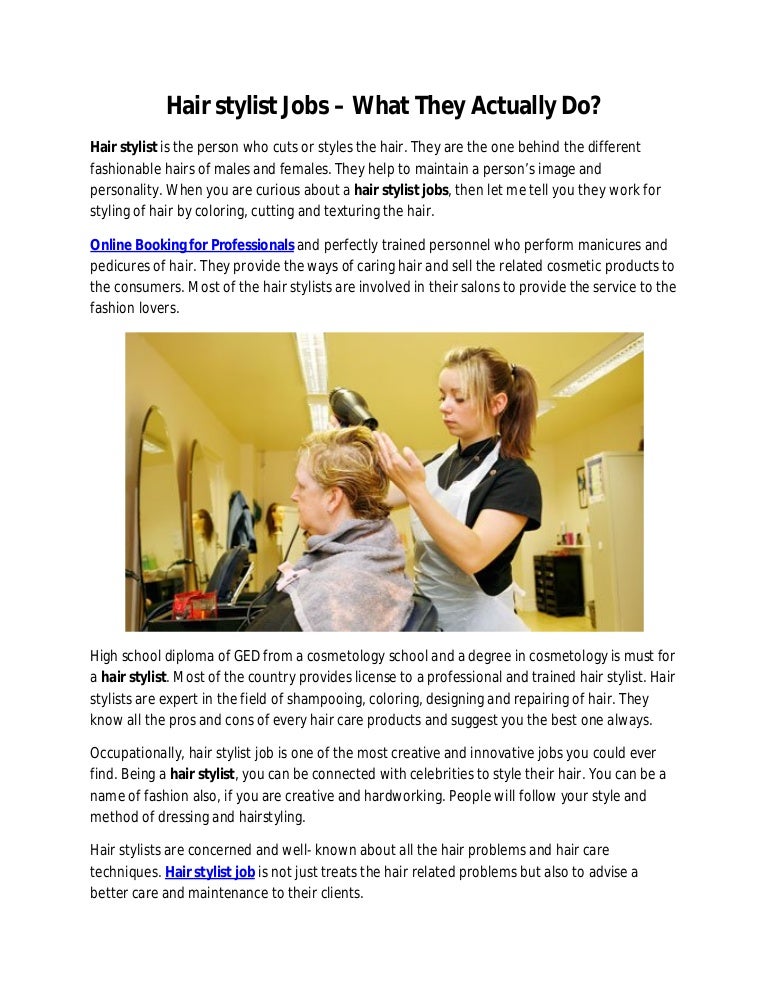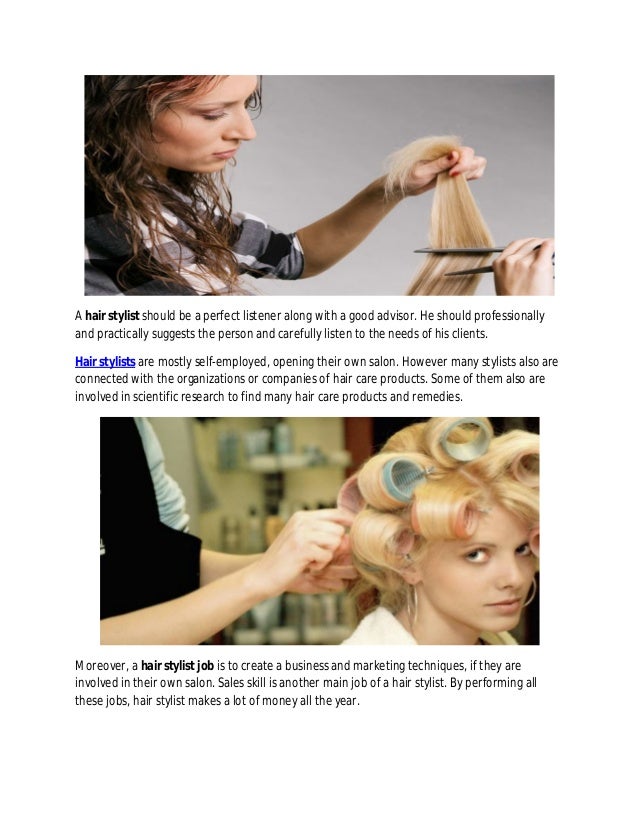Hair Stylist Jobs in 2025: Trends, Skills, and Opportunities
Related Articles: Hair Stylist Jobs in 2025: Trends, Skills, and Opportunities
Introduction
With enthusiasm, let’s navigate through the intriguing topic related to Hair Stylist Jobs in 2025: Trends, Skills, and Opportunities. Let’s weave interesting information and offer fresh perspectives to the readers.
Table of Content
Hair Stylist Jobs in 2025: Trends, Skills, and Opportunities

The hair styling industry, a vibrant and ever-evolving sector, is poised for significant change by 2025. While the core principles of artistry and client satisfaction remain constant, technological advancements, shifting consumer preferences, and economic factors will reshape the landscape of hair stylist jobs. This article delves into the projected trends, necessary skills, and exciting opportunities awaiting aspiring and established hair stylists in 2025.
I. The Shifting Landscape: Trends Shaping the Industry
Several key trends will significantly influence the hair stylist job market in 2025:
-
Technological Integration: Technology is no longer a futuristic concept; it’s integral to modern hair styling. Virtual reality (VR) consultations, allowing clients to visualize hairstyles before committing, are becoming increasingly common. Augmented reality (AR) apps offer similar capabilities, allowing clients to "try on" different looks using their phone’s camera. Digital marketing and online booking systems are essential for attracting and managing clients effectively. Hair stylists proficient in utilizing these technologies will have a competitive edge.
-
Sustainability and Eco-Consciousness: Consumers are increasingly aware of the environmental impact of their choices, and this extends to the beauty industry. Demand for eco-friendly hair products, sustainable salon practices (reducing water and energy consumption, using recyclable materials), and ethical sourcing will rise. Hair stylists demonstrating a commitment to sustainability will attract environmentally conscious clients.
-
Specialization and Niche Markets: The days of the generalist stylist are waning. Specialization in specific areas like natural hair styling, extensions, balayage, men’s grooming, or wig making will be highly sought after. Catering to niche markets, such as specific ethnicities or age groups, can also create a loyal clientele and establish a strong brand identity.
-
The Rise of the Freelance and Mobile Stylist: The gig economy continues to expand, offering hair stylists the flexibility to work independently. Mobile styling services, offering in-home or on-location appointments, are gaining popularity, particularly for wedding parties, events, and busy clients. This requires strong organizational skills, self-promotion abilities, and effective client management.
-
Health and Wellness Integration: The connection between physical and mental well-being is increasingly recognized. Salons are evolving into holistic wellness spaces, offering services like scalp massages, aromatherapy, and mindfulness practices alongside traditional hair styling. Stylists integrating these elements into their services can enhance the client experience and stand out from the competition.
-
Personalized and Customized Services: Mass-market solutions are giving way to personalized experiences. Clients desire customized consultations, treatments tailored to their individual hair type and needs, and a highly personalized approach to their overall salon experience. This demands strong communication skills, a keen eye for detail, and the ability to understand and cater to individual client preferences.
II. Essential Skills for Hair Stylists in 2025
To thrive in the evolving hair styling landscape, stylists need to develop a comprehensive skillset encompassing both technical expertise and soft skills:
-
Advanced Technical Skills: Proficiency in various cutting techniques, coloring methods (including balayage, ombre, and highlights), styling, and hair treatments is fundamental. Staying updated on the latest trends and techniques through continuous learning and professional development is crucial.
-
Client Communication and Consultation: Effective communication is paramount. Hair stylists need to actively listen to clients, understand their needs and preferences, and provide personalized recommendations. This includes explaining procedures clearly, managing expectations, and addressing concerns effectively.
-
Business Acumen: Whether working independently or in a salon setting, understanding basic business principles is essential. This includes marketing, pricing strategies, financial management, client relationship management (CRM), and inventory control.
-
Digital Literacy: Proficiency in using various digital tools, including online booking systems, social media platforms for marketing, and digital payment systems, is crucial for attracting and managing clients effectively.
-
Creativity and Innovation: The ability to create unique and stylish looks, adapt to new trends, and experiment with innovative techniques is essential for standing out in a competitive market.
-
Problem-Solving and Adaptability: Unexpected situations can arise in the salon. Hair stylists need to be able to think on their feet, solve problems creatively, and adapt to changing circumstances.
-
Teamwork and Collaboration (for salon-based stylists): Working effectively as part of a team is vital in a salon environment. This involves collaborating with other stylists, receptionists, and salon managers to provide a seamless and positive client experience.
-
Hygiene and Safety: Maintaining a high standard of hygiene and adhering to safety protocols is crucial for protecting both the stylist and the client’s health.
III. Opportunities for Hair Stylists in 2025
The evolving industry presents numerous opportunities for hair stylists:
-
Specialization and Niche Markets: As mentioned earlier, specializing in a particular area, like natural hair care, extensions, or men’s grooming, can create a strong niche and attract a loyal clientele.
-
Freelancing and Mobile Styling: The flexibility and independence offered by freelance work are highly attractive. Mobile styling allows stylists to reach clients who may not be able to visit a traditional salon.
-
Salon Ownership: For ambitious stylists, owning their own salon offers the ultimate control and potential for higher earnings. This requires strong business acumen and entrepreneurial skills.
-
Education and Training: Experienced stylists can leverage their expertise by offering training and workshops to aspiring hair stylists or professionals seeking to enhance their skills.
-
Product Development and Brand Collaboration: Some stylists may pursue opportunities to develop their own hair care products or collaborate with existing brands.
-
Content Creation and Influencer Marketing: Building a strong online presence through social media platforms and creating engaging content can attract new clients and establish a personal brand.
-
Corporate Partnerships: Some stylists find opportunities working with corporations, providing hair styling services for employees or events.
IV. Preparing for the Future: Continuous Learning and Adaptation
The hair styling industry is dynamic and constantly evolving. To remain competitive in 2025 and beyond, hair stylists need to commit to continuous learning and adaptation:
-
Invest in Continuing Education: Attend workshops, seminars, and online courses to stay updated on the latest trends, techniques, and technologies.
-
Network and Build Relationships: Connect with other professionals in the industry, attend industry events, and build relationships with potential clients and collaborators.
-
Embrace Technology: Become proficient in using digital tools for marketing, client management, and online booking.
-
Develop Strong Business Skills: Gain a solid understanding of business principles, including financial management, marketing, and customer service.
-
Stay Informed about Industry Trends: Keep abreast of emerging trends, new products, and technological advancements through industry publications, blogs, and social media.
V. Conclusion:
The hair styling industry in 2025 will be a dynamic and competitive landscape. However, for hair stylists who embrace technological advancements, specialize in niche areas, develop strong business acumen, and commit to continuous learning, the opportunities for success are significant. By adapting to the evolving trends and cultivating the necessary skills, hair stylists can build thriving careers and contribute to the continued growth and innovation of this exciting industry. The future of hair styling is bright, and those who prepare themselves effectively will be well-positioned to capitalize on the many opportunities that lie ahead.








Closure
Thus, we hope this article has provided valuable insights into Hair Stylist Jobs in 2025: Trends, Skills, and Opportunities. We hope you find this article informative and beneficial. See you in our next article!